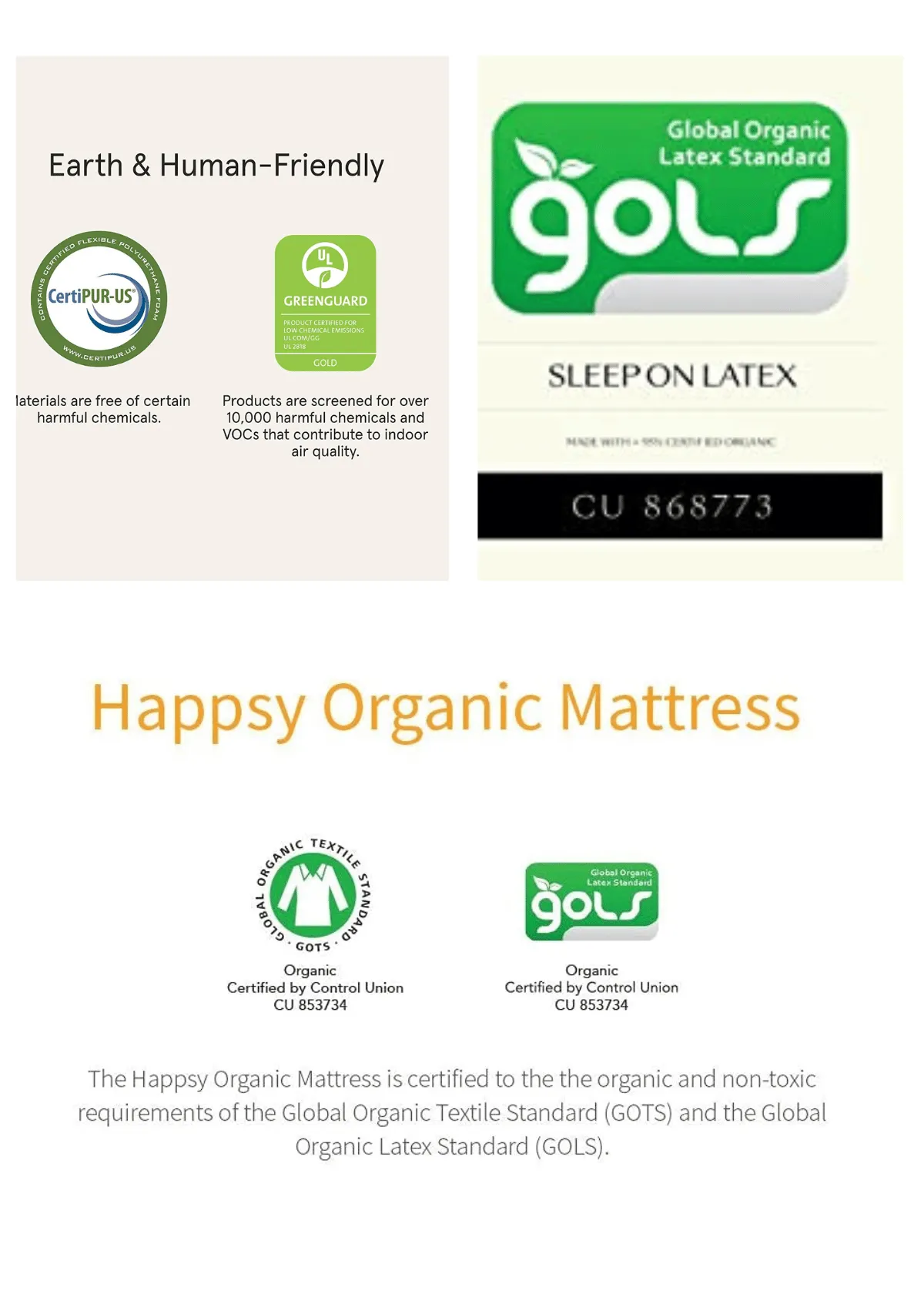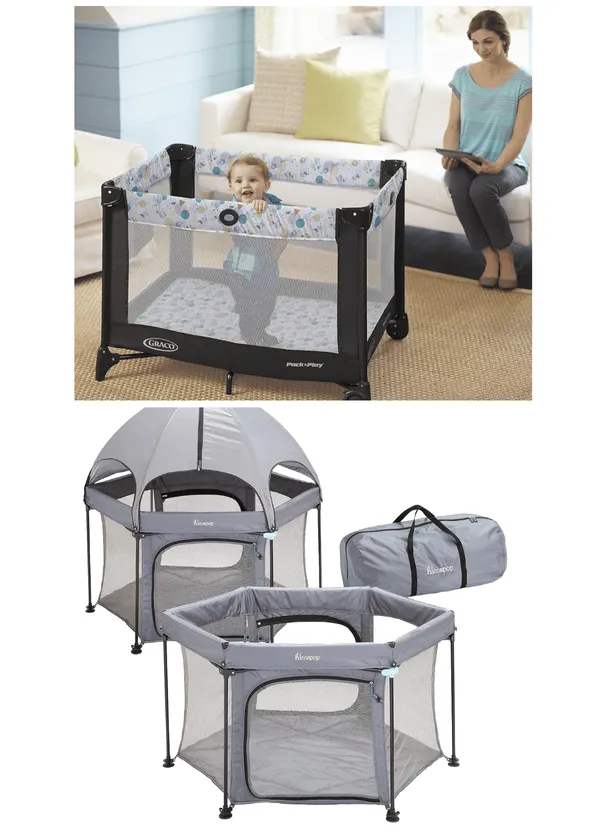(Last Update: 12/20/2024)
In today's consumer market, there's an overwhelming array of choices regarding mattresses and mattress manufacturers. From different non-toxic materials, technologies, mattress companies, and sleep brands to a broad range of prices, making the right decision can seem daunting.
But one aspect that often goes unnoticed yet significantly impacts the quality and safety of your sleep is mattress certifications.
A certified mattress has undergone rigorous testing to meet the established safety, health, eco-friendly materials, and environmental standards.
These certifications give us valuable insight into what we are bringing into our bedrooms and laying our bodies on for an average of seven to nine hours daily.
A good night's sleep is about more than just comfort; it's also about peace of mind.
In this post, I will explore the world of mattress certifications, their importance for your health, and how to ensure that your next mattress meets the highest standards. Stay tuned!
Section 1: Why Mattress Certifications Matter
As consumers, we often take the products' quality for granted, assuming they meet basic safety and health standards.
This is particularly true regarding mattresses, a finished product we trust to provide comfort and restorative sleep each night. However, mattresses vary in their construction quality. Some may contain materials or toxic chemicals that could negatively impact our health and well-being.
- That's where certifications come into play. Certifications are essentially seals of approval from an independent, third-party organization, often a non-profit organization, that assesses and verifies that an entire product meets certain standards of non-toxic materials.
- When a mattress has a recognized certification, it has been thoroughly tested and found to meet these stringent criteria. This can give you peace of mind that you're not just buying a comfortable bed but one that's safe, healthy, and responsibly produced.
Certifications protect us from harmful substances often used in mattress production, non-toxic, heavy metals, and chemical flame retardants.
They also ensure that the nontoxic mattress is made considering environmental health, sustainability, material health, and ethical and fair labor practices.

Understanding Mattress Certifications and Your Health
Not all beds are created equal, especially when it comes to health. Organic mattresses, certified by the Eco-Institute, ensure that the entire mattress, including organic textiles like New Zealand wool, is free from harmful flame retardants and synthetic latex.
- These third-party certifications scrutinize the entire supply chain, ensuring each component, organic fabrics such as organic wool, meets stringent health standards. Unfortunately, most mattresses lack these certifications, leading to potential exposure to toxic chemicals.
- Choosing non-toxic mattresses is more than comfort; it's a commitment to health and well-being.
Mattress certifications ensure products are made without harmful substances, like lead and other heavy metals, safeguarding against other health issues.
To earn gold certifications, mattresses must meet strict criteria for non-toxicity, including low levels of VOCs, making them suitable for sensitive people.
These standards also emphasize low pollutant production and socially responsible practices, addressing social and environmental concerns. These certifications aren't just about comfort and offering a healthy, safe sleeping environment.
Section 2: Understanding the Importance of Mattress Certifications for Health
Imagine bringing home a new mattress, laying it on your bed frame, and sinking into its comforting embrace for a deep, restful sleep.
Now, imagine that same mattress subtly emitting a cocktail of potentially toxic chemicals, disrupting your sleep sanctuary and impacting your health over time.
Not such a soothing image, right? This is where mattress certifications step in, like a health-conscious superhero.
Certifications serve as your detectives, examining mattresses and ensuring they uphold the highest standards for your health.
You might be surprised to learn that certain mattresses can release volatile organic compounds (VOCs), phthalates, or heavy metals and create health problems.
Mattress certifications ensure minimal chemical exposure and adherence to health-based criteria, especially in textile products like domestic textiles in healthcare facilities.
Common certifications, such as the Eco Institut standard, evaluate mattresses against strict standards, including excluding harmful TCEP flame retardants. Like the green label, these labels assure consumers of safe materials and a sustainable production process.
Certifications often extend to climate neutrality, ensuring the mattress products contribute positively to the environment. Such rigorous evaluation guarantees that your mattress supports your health and the planet.
Protects You From Greenwashing
Many mattress producers use the label "natural, green, sustainable," even if the mattresses do not fit those specifications. Greenwashing involves selling artificially created bedding as organic or sustainable.
In short, these mattress companies' certifications are not just labels; they are your silent, reliable health guardians, tirelessly working to ensure that your sanctuary of rest is a haven for you and your loved ones.

Section 3: Major Mattress Certifications and What They Mean
Navigating the world of mattress certifications can be akin to learning a new language. With numerous acronyms and terminologies, it's easy to get overwhelmed. So, let's break down the language barrier and explore major and main mattress certifications.
In the context of mattress certifications, "passing products" refers to mattresses that have successfully met the required standards set by certification bodies and thus have a very low environmental impact.
These products have undergone rigorous testing and evaluation processes and have been found to comply with specific criteria, such as safety, quality, environmental impact, or health standards.
CertiPUR-US Certification: Volatile organic compounds (VOC)
- Consider this your mattress's diploma in foam safety. Products with CertiPUR-US Certification have low VOC emissions for indoor air quality, meaning fewer smelly, harmful chemicals.
- They're also made without ozone depleters, PBDEs, TDCPP or TCEP, chemical flame retardants, mercury, lead, heavy metals, non-toxic materials, and phthalates. Best for safe(r) polyurethane foam.
What do Low Volatile Organic Compound emissions for indoor air quality mean?
CertiPUR-US, an often undervalued certification, is crucial in mitigating health risks associated with mattresses. Mattresses can emit certain substances and other Volatile Organic Compounds (VOCs) that can slowly seep out and potentially impact human health.
Many foam mattresses can also contain flame-retardant chemicals, posing health hazards. CertiPUR-US, overseen by the Alliance for Flexible Polyurethane Foam, doesn't certify entire mattresses but specifically verifies the safety of the polyurethane foam used.

Global Organic Textile Standard (GOTS)
The best standard for ensuring natural fibers are certified organic is the Global Organic Textile Standard (GOTS). GOTS-certified mattresses are like the organic apples of the mattress world.
They're made with at least 70% certified natural and organic materials and organic fibers. An organic mattress offers a healthier sleep environment, free from harmful chemicals, enhancing comfort and ensuring a night of restful, natural, and better sleep.
A GOTS seal is like personal assurance of the purity of all-natural organic fibers, fabrics, and materials! When a company needs certification, GOTS agents usually inspect its entire textile supply chain on-site.
Global Organic Latex Standard (GOLS)
Have you got a soft spot for natural latex mattresses? Then, please be on the lookout for this certification.
The GOLS certification is a globally recognized standard that ensures that the latex (made from rubber tree sap) in your natural latex mattress and natural mattresses is over 95% organically produced. It's your ticket to a chemical-free, natural latex mattress dreamland.
OEKO-TEX Standard 100
The best OEKO-TEX-certified mattresses ensure textiles are tested for harmful substances.
This global testing and accreditation program limits nearly 100 harmful chemicals, heavy metals, and allergens.
Being OEKO-TEX Standard 100 certified is like having a team of international scientists ensuring your mattress's safety and purity.
If you have allergies or sensitive skin, this OEKO-TEX certification process can be a game-changer!

GreenGuard Gold Certification
What do Greenguard Gold-certified products mean? GreenGuard Gold certification ensures that a sleep product meets some of the world's most rigorous standards for low emissions of VOCs to reduce indoor air pollution. Think of it as a "fresh, indoor air pollution out" seal of approval!
Greenguard Certification indicates the mattress was tested for certain levels of toxic chemicals such as formaldehyde and flame retardants.
Fair Trade Certification
This is because building materials are produced using a methodology based on Fair Trade certification. This certificate certifies that materials have been produced safely and healthily and that no children or child labor are used during manufacturing.
Being fair trade certified, the raw materials used are typically easily traceable, allowing you to view the entire production and manufacturing process.
American-Grown NOP-Certified Organic Cotton and Oregon Tilth (OTCO)
- The OTCO refers to cotton grown in the U.S. adhering to the USDA's National Organic Program (NOP) standards, ensuring it's free from synthetic pesticides and fertilizers.
- The USDA Organic label signifies that a final product meets the strict guidelines of the United States Department of Agriculture for organic farming and production.
- This means the product is produced without synthetic pesticides, genetic modification, and conventional methods.
- Oregon Tilth (OTCO) is a leading nonprofit certifier of organic products. It offers comprehensive services that support sustainable farming and ethical business practices in local communities.
Wool Integrity NZ Certified
This certificate only covers New Zealand wool found inside mattresses or bed sheets. This certificate shows how wool is handled ethically, from production to marketing.
Why should you care? Wool's journey to the bed involves many procedures, many of which are quite unethical.

Best for identifying a climate-friendly mattress company: B Corp Certification
These certificates determine the overall impact of the business on society and its environment.
It Gots certification helps businesses demonstrate high standards for accountability on everything from carbon emissions to renewable energy, from carbon management to employee and material health benefits to charitable giving.
A climate-neutral certified or neutral-certified mattress indicates that its production and manufacturing process produces net-zero carbon emissions.
Organic cotton must be certified with the USDA's National Organic Program (NOP) or by Oregon Tilth or Oregon Organic. This certification guarantees that cotton production complies with organic growth management and environmental guidelines.
UL Flammability Standard
UL Flammability Standard is a crucial international certification. The standard categorizes the plastics according to how they burn.
How does this certificate prove flammability? The material in your mattress varies according to its composition.
The Forest Stewardship Council (FSC)
- In the mattress industry, the Forest Stewardship Council ensures that the wood-based materials used in testing mattresses are sourced from responsibly managed forests.
- The wood-based materials, like those in bed frames, are sourced from forests that are responsibly managed with consideration for environmental sustainability and social responsibility.
Eco Institut-certification:
Eco Institut-certified mattresses, tested by a German lab, use natural materials free of harmful chemicals, such as heavy metals, hazardous chemicals, total chemical emissions, and carcinogens, and they limit off-gassing emissions.
They exceed Germany's stringent safety standards, promoting healthier and eco-friendly sleep.
More companies are adopting mattress certifications that ensure materials are ethically grown and socially equitable. These certifications often involve reduced pesticide use, letting consumers rest easy, knowing their mattress is produced responsibly and environmentally friendly.
Section 3: How to Check for Certifications When Buying a Mattress
It's time to put on your detective hat! Let's dive into how you can uncover those all-important mattress certifications while shopping.
First things first, don't be shy about asking questions. Whether you're in a brick-and-mortar store or navigating online, sales representatives or customer service teams should be able to provide details about certifications. If they can't, consider it a red flag!
- If you're shopping in person, you can tour the mattress. Certification labels are often placed on the mattress's tag or sewn into the seam. Make sure to check all sides!
- The product page is a gold mine for online shopping. Look for a dedicated section listing the product's certifications, usually near the description or the technical details.
If you need help finding the information, a quick search in the FAQs might be helpful for you. Are you still waiting? Could you contact customer service before making the purchase?

Section 4: Potential Pitfalls and Misconceptions Around Mattress Certifications
There's room for misconceptions and potential pitfalls in the complex world of mattress certifications. So, let's debunk some of these myths and illuminate the path toward a well-informed purchase.
Firstly, a common misconception is that all certifications are created equal. They're not! Some are more rigorous and encompassing than others.
For example, OEKO-TEX Standard 100 addresses a wider range of substances than CertiPUR-US. Understanding the scope of each certification can help you pick the one that best suits your needs.
Another pitfall is the misconception that "natural" or "eco-friendly" automatically means certified.
These terms are often used loosely and don't necessarily meet official certifications' stringent ecological and social criteria. So, beware of "greenwashing," claims of eco-friendliness that may be exaggerated or untrue.
Lastly, please keep in mind partial certifications. Sometimes, only a portion of the used mattress materials (like the cover) is certified, while the rest needs to meet the standard.
Conclusion: Choosing the Right Certified Mattress for You
Choosing a mattress is more than comfort - safeguarding your health and championing sustainability.
Certifications are your reliable guides, helping you navigate the world of mattresses beyond the fluff and springs. From CertiPUR-US to OEKO-TEX, each certification tells a story of safety, health, and environmental responsibility.
But remember, the right certified mattress for you marries these assurances with your comfort and budget.
I suggest looking into all your options carefully. Step forward confidently into your mattress shopping journey, knowing you're investing in not just better sleep but also a healthier you and a greener world. Sweet dreams!
FAQs
Why should you Look beyond synthetic foams?
The second point is that a consumer should always opt for a mattress made entirely of softer material like foam; these materials have been proven to be a source of toxic toxins released by chemicals. Alternatives include combining natural Latex and cotton. Ideally, mattress materials for a bed made from PU foam should have the full Greenguard GOLD and CertiPUR certifications.
How do I know if my mattress is toxic?
Ensure you're using a global organic latex standard certification (GOS) - to ensure that all the latex inside a mattress is 99% organic sap from authentic rubber trees. Also, check out California Prop 65's label, which warns of dangerous chemicals on mattresses.
Are all mattress certifications the same?
No, all mattress certifications are not the same. Each certification has different criteria and focuses on specific aspects of the mattress for human health and high-quality materials. For example, the CertiPUR-US certified process focuses on foam materials, while GOTS and GOLS certified organic fibers and natural latex mattresses. Understanding what each certification means to make the best choice is important.
How do flame retardants work in mattresses?
The mattresses are designed with your health in mind. They exclude harmful materials like high VOCs, formaldehyde, prohibited phthalates, and flame retardants. These flame retardants reduce the mattress's ignition ability, maintaining safety without compromising health.







